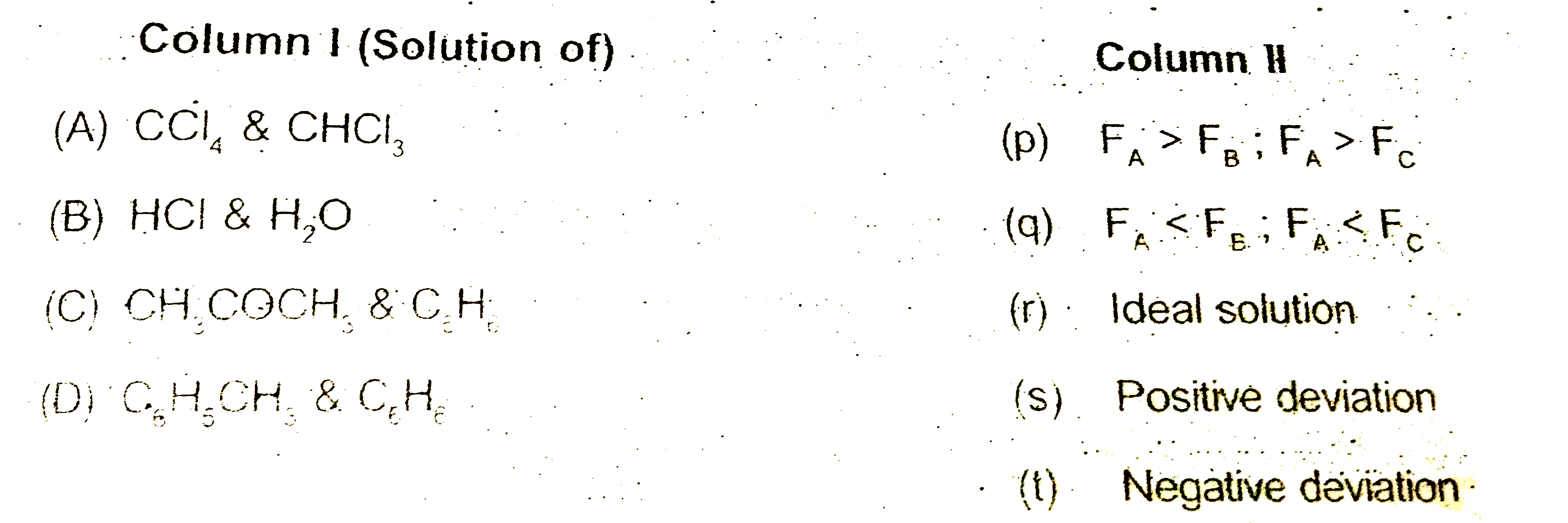If solute and solvent interactions are more than solute- solute and solvent -solvent interactions then
It is ideal solution
It is non-ideal solution with positive deviation
It is non-ideal solution with negative deviation
Can't predicted
The correct Answer is:C
To solve the question, we need to analyze the interactions between solute and solvent, as well as the implications of those interactions on the behavior of the solution according to Raoult's Law.
1. Understanding Interactions:
- In a solution, there are three types of interactions: solute-solute, solvent-solvent, and solute-solvent.
- The question states that the interactions between solute and solvent are stronger than the interactions between solute-solute and solvent-solvent.
2. Implication of Stronger Solute-Solvent Interactions:
- When solute-solvent interactions are stronger, it means that the molecules of the solute and solvent are more attracted to each other than they are to themselves.
- This leads to a situation where the overall energy of the system is lower due to the formation of stronger bonds between solute and solvent.
3. Raoult's Law:
- According to Raoult's Law, the partial vapor pressure of a component in a solution is proportional to its mole fraction in the liquid phase.
- For component A (solute), the partial pressure PA is given by:
PA=P0A⋅xA
- For component B (solvent), the partial pressure PB is:
PB=P0B⋅xB
- The total pressure Pt of the solution is:
Pt=PA+PB=P0A⋅xA+P0B⋅xB
4. Determining the Type of Deviation:
- If the solute-solvent interactions are stronger, the vapor pressures of the components will be lower than expected based on Raoult's Law. This is because the stronger interactions make it harder for the molecules to escape into the vapor phase.
- Therefore, the total pressure Pt will be less than what is predicted by Raoult's Law for an ideal solution.
5. Conclusion:
- Since the total pressure is lower than expected, this indicates a negative deviation from Raoult's Law.
- Thus, if solute and solvent interactions are stronger than solute-solute and solvent-solvent interactions, the solution exhibits a negative deviation.
Final Answer:
If solute and solvent interactions are more than solute-solute and solvent-solvent interactions, then the solution exhibits a negative deviation from Raoult's Law.
- In a solution, there are three types of interactions: solute-solute, solvent-solvent, and solute-solvent.
- The question states that the interactions between solute and solvent are stronger than the interactions between solute-solute and solvent-solvent.
- When solute-solvent interactions are stronger, it means that the molecules of the solute and solvent are more attracted to each other than they are to themselves.
- This leads to a situation where the overall energy of the system is lower due to the formation of stronger bonds between solute and solvent.
- According to Raoult's Law, the partial vapor pressure of a component in a solution is proportional to its mole fraction in the liquid phase.
- For component A (solute), the partial pressure PA is given by:
PA=P0A⋅xA
- For component B (solvent), the partial pressure PB is:
PB=P0B⋅xB
- The total pressure Pt of the solution is:
Pt=PA+PB=P0A⋅xA+P0B⋅xB
- If the solute-solvent interactions are stronger, the vapor pressures of the components will be lower than expected based on Raoult's Law. This is because the stronger interactions make it harder for the molecules to escape into the vapor phase.
- Therefore, the total pressure Pt will be less than what is predicted by Raoult's Law for an ideal solution.
- Since the total pressure is lower than expected, this indicates a negative deviation from Raoult's Law.
- Thus, if solute and solvent interactions are stronger than solute-solute and solvent-solvent interactions, the solution exhibits a negative deviation.
If solute and solvent interactions are more than solute-solute and solvent-solvent interactions, then the solution exhibits a negative deviation from Raoult's Law.
Similar Questions
Column I
(A) Ideal solution
(B) Solutions showing positive deviations
(C) Solutions showing negative deviations
Column II
(P) Solute-solvent interactions are weaker than solute-solute
(Q) Solute-solvent interactions are similar to solutesolute
(R) Solute-solvent interactions are stronger than solute-solute interactions
View SolutionExplain solute solvent and solution ?
View Solution
Knowledge Check
Each question contains STATEMENT-I(Assertion) and STATEMENT-2(Reason).the statement carefully and mark the correct answer accoring to the instrution given below:
STATEMENT - 1 : An ideal solution obeys Raoult's law.
STATEMENT - 2 : In an ideal solution, solute-solvent as well as solvent-solvent, interactions are similar to solute - solvent interactions.AIf both the statements are TURE and STATEMENT-2 is the correct explanation STATEMENT-1BIf both the statements are TURE but STATEMENT-2 is NOT the correct explanation STATEMENT-1CIf STATEMENT-1 is TURE and STATEMENT-2 is FALSEDIf STATEMENT-1 is FA,SE and STATEMENT-2 is TRUEAssiertion : An ideal solution obeys Raoult's Law.
Reason : In and ideal solution, solute-solute as well as solvent-solvent interations are similar to solute-solvent interations.AIf both assertion are reason are correct and reason is correct explanation for assertion.BIf both assertion and reason are corrct but reason is not correct explanation for assertion.CIf assertion is corrct but reason is incorrect.DIf assertion and reason both are incrrect.Assertion (A): An ideal solution obeys Henry's law.
Reason (R): In an ideal solution, solute-solute as well as solvent-solvent interactions are similar to solutesolventinteractionABoth A and R are true and R is the correct explanation of ABBoth A and R are true but R is NOT the correct explanation of ACA is true but R is falseDA is false and R is True
define (a) solute and (b) solvent
View SolutionLet , solute - solvent intermolecular attraction force =FA
solute - solute intermolecular attraction force =FB
solvent - solvent intermolecular attraction force =FC
Match the following

View SolutionWhat do you understand by solute and solvent ?
View SolutionWhen a solute is dissolved in a solvent
View SolutionThe solubility of a solute in a solvent (that is, the extent of the mixing of the solute and solvent species) depends on
View Solution
